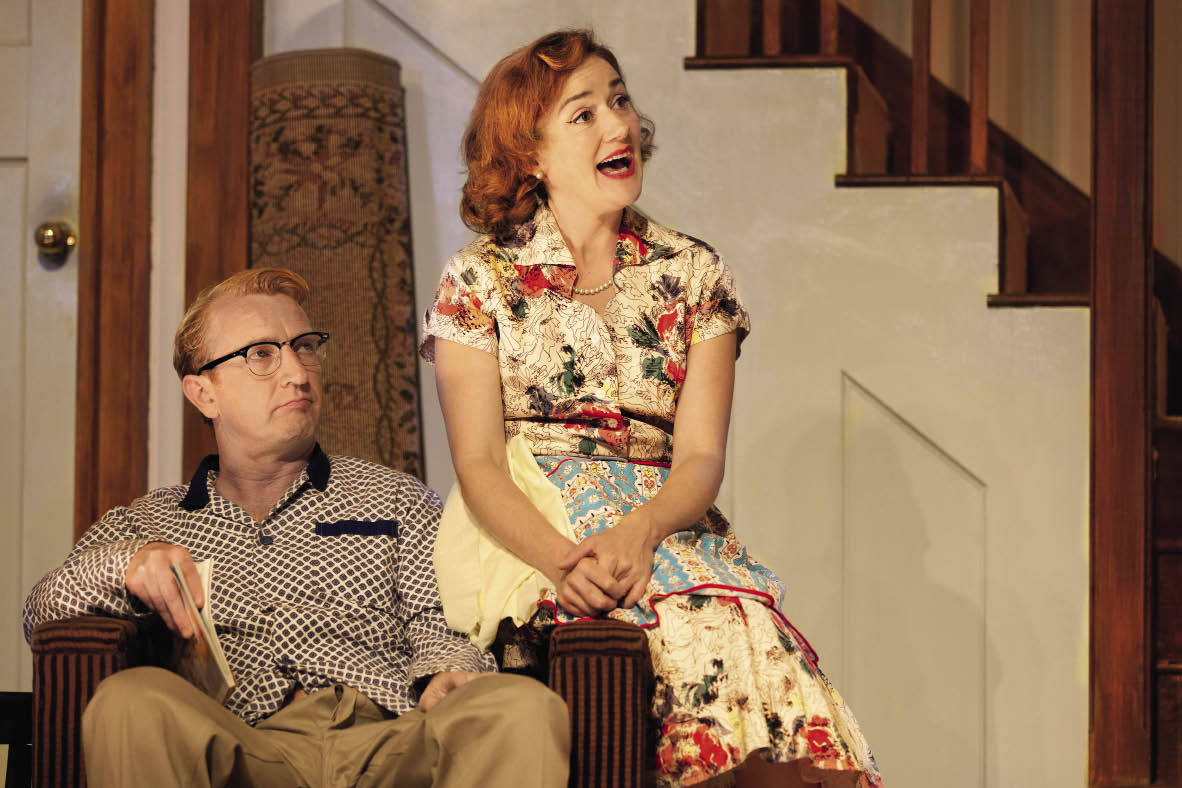Clybourne Park
Royal Court, until 2 October
Tiny Kushner
Tricycle, until 25 September
Bash the bourgeoisie is a game the Royal Court likes playing and I’m always keen to join in. Bruce Norris, a brilliant American satirist, delighted us a few years back with The Pain and the Itch, a hilarious exposure of middle-class hypocrisy. Clybourne Park is a pair of plays set in a house in the prosperous Chicago suburbs. We start in the 1950s when black families are just arriving in the neighbourhood. We then fast-forward 60 years and see prosperous whites returning after decades of poverty and neglect.
The earlier play feels very wonky. The dice are overloaded against the whites. As well as their black servants, they have a deaf friend and a kid next door with Down’s syndrome. As this conveyor-belt of disadvantage trundles past we’re invited to gawp and giggle at our ancestors’ painful inability to conceal their prejudices. Norris has serious trouble drawing black characters. Hobbled by reverence he paints them as grave, noble and superior, silent witnesses to the unsubtle intolerance of the whites. And because he’s reluctant to give a black character a fault, let alone a vice, his play has an internal and unwitting apartheid. Whites express themselves freely, blacks are blurred and impaired.
The second play is a vast improvement. Members of a housing partnership gather to discuss how to spruce up their multicultural neighbourhood. The meeting turns ugly when the vexed issue of race finally breaks the surface. Fearlessly, joyously, Norris forces his characters to the edge and makes them unleash their true feelings by telling each other racist jokes. ‘What’s long and hard on a black man?’ ‘First grade.’ ‘How many white men does it take to change a light bulb?’ ‘All of them. One to hold the bulb while the rest of ’em screw up the entire world.’ Spoken aloud before their intended targets the jokes entirely lose their power. This isn’t just fascinating and hugely entertaining, it’s genuinely liberating, too, an experience only the theatre can deliver. The censorship veiling our daily thoughts is cast aside and the human mind is revealed in all its mired and questing frailty.
Great stuff, but is it worth yawning through the first play to reap the rewards of the second? Definitely. The decisive factor is Sophie Thompson (Emma’s little sister), one of the funniest actresses in the theatre. She gives two entirely different performances here — a weak-minded silly billy of a housewife and a hard-bitten feminist lawyer — and both are superb feats of comedy. Thompson is an under-rated star, an alchemist who finds gold in very ordinary materials.
The Trike is presenting a quintet of short plays by Pulitzer prize-winner Tony Kushner. The Pulitzer began as an arts award but has evolved into a highly effective early warning system. If you haven’t heard of Tony Kushner, that’s because he isn’t worth hearing from. Finding good playwrights takes precisely no effort. They find you. Kushner’s little plays are fatally marred by their detachment from reality. The nuts-and-bolts world is entirely absent.
The first play is a dialogue between an Albanian princess and a forgotten radio star. It takes place on the moon. Two more plays are set in the afterlife. A third takes the form of an unfilmable screenplay consisting of 18 monologues on the subject of tax evasion. The final play, also set in heaven, shows some dead Iraqi children receiving a sermon on America’s foreign policy from Laura Bush. The lineaments of the author’s prejudices emerge clearly enough but nothing else of value, and my weary eyes declined from the stage to the Trike’s programme notes, which feature an open letter to the PM about proposed cuts to the arts.
Since the debate is hotting up, it’s worth taking a moment to consider the niftier sophistries of the pro-subsidy campaign. To its credit, the Trike shuns ‘vanity lobbying’, which is just name-dropping in disguise. ‘Look at the superstars who’ve signed our petition!’ But they happily peddle a false equivalence between the subsidised sector and the whole of the arts. Arts funding, they say, costs 17p per person per week and produces a return of tens of billions. Specifically, the budget of £121 million invested in theatre ‘is thought to have generated in the region of £2.6 billion’. The chefs have been busy with this bit of book-keeping, as the Trike admits, albeit in deliberately colourless language. (‘This is a mixture of subsidised and commercial activity.’) But never mind. Let’s imagine that these books are uncooked. The Arts Council can convert a hundred million quid into two-and-a-half billion. Wow! What a success story. Only one conclusion is available. Privatise the Arts Council and float it on the stock market. That’s not my idea. It’s the Trike’s.








Comments